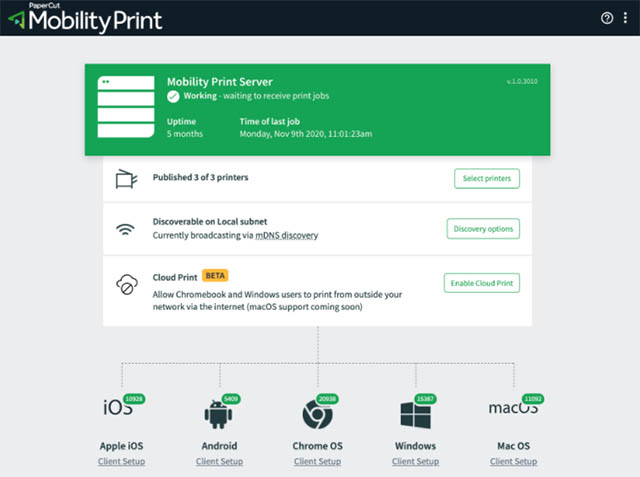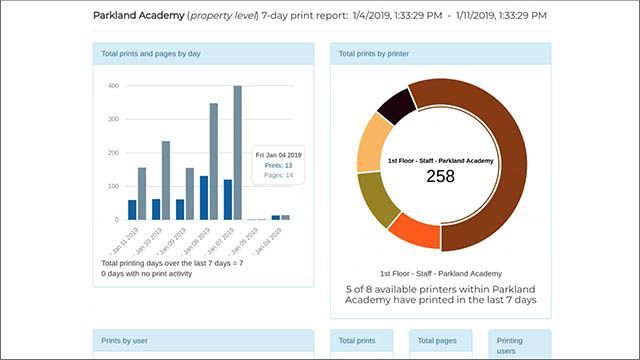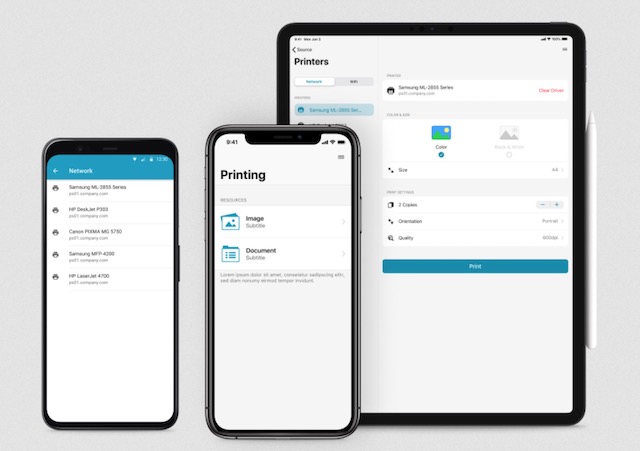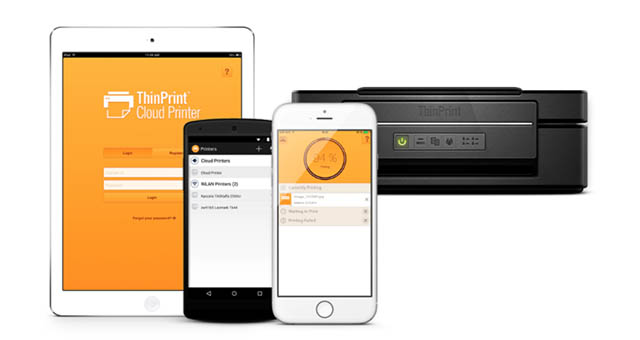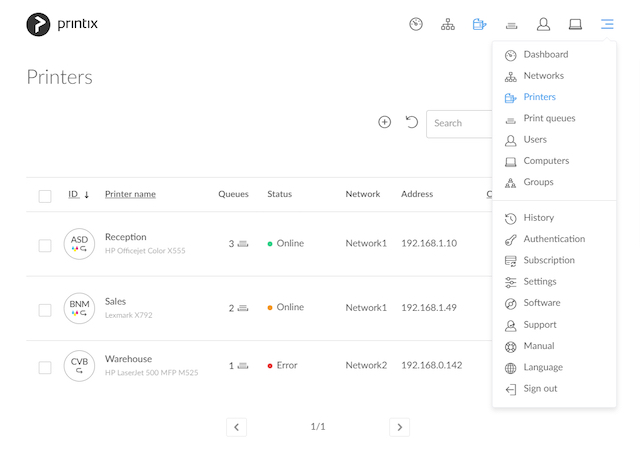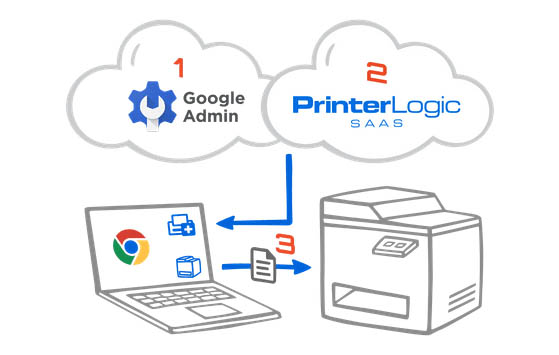Google Cloud Print Alternatives
It’s no secret that Cloud Print was quite popular. But now that it’s being shut down and joining the list of myriad of services that Google has killed over the years, there are a lot of other services that you can use to get similar features. You can connect to printers over the internet, set up printers in your home WiFi network, and do a lot more with these services. Obviously, pricing structures and feature sets vary across these options. However, we will try our best to present this information in an easy to understand way so you can make your decision faster. As always, you can use the table of contents below to skip over to any particular option you want to check out.
1. PaperCut Mobility Print
This is one of the best Google Cloud Print replacement software you will find. PaperCut Mobility Print offers a plethora of features and similar uses as Google’s soon to be defunct option. The software supports Chrome OS, Mac, Windows, iOS, and Android devices. That means you’re pretty much covered no matter which platform you use. It supports Native UI printing with the ‘ctrl+P’ shortcut as well. Mobility Print is meant to be used within local networks, such as an office intranet. However, the company has launched a Cloud Printing feature in beta. This feature will let devices connect to your printers from outside the local network when needed. That’s pretty cool, but it’s currently limited to Chromebooks and Windows devices. Mac support is coming soon.
Also, if you are worried about security and privacy, Mobility Print encrypts your print jobs and metadata. It’s completely free to use as well, which makes it a solid option for individual users, and even SMBs. Noteworthy Features:
Native printing support Encrypted print jobs and metadata Supports all major platforms
Pricing Model: Free, but customers who want support for features like tracking print jobs and advanced authentication for print jobs can use their paid services as well. Check out Mobility Print (website)
2. directprint.io
For large scale enterprises or companies that require all the features of Google Cloud Print and then some, directprint.io is a nice cloud printing solution to consider. In fact, it’s one of the recommended services for migrating from GCP. Directprint offers a driver app that’s a full stack replacement for the Google Cloud Print functionality. It integrates with Chromebooks, Windows and macOS’ native printing solutions. That means you get a native printing experience while using cloud printing solutions, which is great. What’s more, you don’t need to keep a track of printer drivers for your devices. Directprint.io handles all print jobs for you and provides support for all printers.
Obviously, since it’s aimed at enterprises, you get advanced features as well. Directprint offers budgeting features for printers. Plus, you can keep a track of print jobs with extensive print logs, and print charts. There are a lot of other features that directprint.io brings to the table including multiple printing modes to save toner and ink, blank page elimination, full G-Suite integration, and security. Noteworthy Features:
Full integration with G-Suite Advanced print tracking features Secure printing No driver installation required for printers
Pricing Model: Pricing starts at $300 for education customers and $450 for enterprise customers. However, you can use a 30 day free trial to see if the service meets your needs. Check out directprint.io (website)
3. Ezeep
Ezeep is yet another Google Cloud Print replacement that you can consider. In fact, it does a pretty good job of replicating GCP features that you might want to keep using long after GCP is dead. Ezeep has been around for 15 years, so clearly they know the business they are in. Plus, they offer impressive features for your cloud printing needs. Ezeep offers easy set up in just a few clicks via its web interface. Plus you can quickly define access rules for printers on your network.
The service supports Windows 10, Mac, and Chrome, which means you can use it from whichever platform you want to. There are also native apps for iOS and Android, so you can use cloud print services from your smartphone and print documents on the go. For enterprises and privacy conscious users, Ezeep offers advanced security options and strong privacy principles. Plus, you get features like print tracking and reports, BYOD, and secure pull printing to prevent uncollected printed documents. Noteworthy Features:
Easy set up Secure pull printing Print tracking and reports
Pricing Model: Pricing for Ezeep varies by use-cases and organisation size. You can check out plans for shared workspaces, windows virtual desktops and more on the website. You can also use a 30 day free trial to give the service a test run. Check out Ezeep (website)
4. ThinPrint
For consumers and small groups, ThinPrint is a viable alternative to Google Cloud Print. The service supports all major platforms including Windows, macOS, iOS, and Android so you can print using basically any device on your network. ThinPrint connects all the printers in your local network, so you can print from any client device to any printer within your WiFi network. However, if you don’t have a WiFi printer, ThinPrint has you covered there as well.
You can use its Cloud Printer Connector to convert your printers into cloud printers via a PC or Mac. Then you can use the cloud printer to print wirelessly. Like I said, ThinPrint is aimed at consumers and not enterprises. As such you won’t get advanced features like budgeting and print tracking with ThinPrint. You also won’t get features like secure pull printing like you get with Ezeep. However, ThinPrint is completely free, and offers compatibility with pretty much every printer out there, so it’s a solid choice for your home network printing needs. Noteworthy Features:
Completely free Can convert regular printers into cloud printers
Pricing: Completely free Check out ThinPrint (website)
5. Printix
You can also check out Printix if you’re looking for an alternative to Google’s Cloud Printing solution. The service offers plenty of features that make it a viable cloud printing option for you to check out. Unlike ThinPrint, Printix isn’t a free service, but it makes up for that by bringing advanced features and IT support. You get features like direct IP printing, mobile print, secure print, chromebook printing, etc. Plus, you can print with pretty much any device thanks to Printix’s support for Chrome, Windows, Mac, Android, and iOS.
Since you’re looking for GCP alternatives, chances are you’re heavily invested in the G-Suite ecosystem as well. Printix has Google Workspace integrations readily available for you. With these, you can deploy, control and manage your printing environment etc. Printix also helps IT by automatically installing printer drivers, deploying client software, monitoring printer and user behaviour, as well as providing actionable insights and reports. Notable Features:
Direct IP printing, mobile printing, etc. Integrations with Google Workspace Actionable insights and reports
Pricing Model Printix’s pricing model is based on the number of users in your organisation. Pricing starts at $1.49 per user per month (paid annually) for up to 50 users. However, you can check out a free 1 month trial before you make a decision. Check out Printix (website)
6. PrinterLogic
PrinterLogic is another recommended replacement for Google Cloud Print. The service brings a host of features making it a viable printing solution. Thanks to its Chrome extension, PrinterLogic makes it easy to migrate from GCP. Plus, it supports multi OS environments, so you can initiate print jobs from any endpoint. PrinterLogic is a serverless SaaS solution, and it can grow along with your business, so you’ll not need to change providers as you grow from an SMB to a large scale enterprise. It offers central print management features, so you can keep a track of all print jobs in one place.
What’s more, it supports Direct IP printing, which ensures that your data remains local (doesn’t leave the network) and secure. Noteworthy Features:
Direct IP printing Support for multi-OS endpoints
Pricing Model: PrinterLogic doesn’t share its pricing model on the website. However, you do have the option to get a 30 day free trial before enquiring about pricing. Check out PrinterLogic (website)
7. YSoft
YSoft is another option you can go with to solve your cloud printing needs. The service offers a wide range of features. With print authentication features you can assign user rights and workflows, plus identify users. You also get fact-based audits of print, copy, and scan usage, along with the option to use pre-defined reports or custom reports for your cloud printing solution. YSoft also supports BYOD, so your users can send print requests from their own devices, and it supports secure mobile printing and secure guest printing as well. The service also supports workflows and integrations with Microsoft SharePoint, Dropbox, and more. Plus you can implement governance rules for printing, including things like forced BW prints, double-sided pages, etc. Noteworthy Feature:
Google Recommended GCP alternative Fact-based reports Workflows and integrations
Pricing Model: You can contact YSoft to get pricing details for your requirements. Check out YSoft (website)
Bonus: Use a Docker Hosted CUPS Instance
If you are not interested in using third party solutions, you can actually host your own cloud printing service of sorts with Docker. It requires knowledge of servers, using the command line, etc. However, you will end up with your own, self hosted cloud printing solution. If that sounds like something you’re interested in, you should check out this link for details and help on how to get CUPS up and running.
Use These Google Cloud Print Alternatives to Continue Remote Printing
Google Cloud Print may be shut down now, but there are a lot of other options that you can consider moving on to. Some of these options are free, like PaperCut Mobility, whereas there are paid options with advanced features for enterprises that you can also take a look at, such as YSoft, Directprint, and others. Or, if you’re feeling up to it, you can host your own CUPS instance and get things done yourself. So, which GCP replacement have you decided to go with and why? Let us know in the comments.
